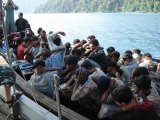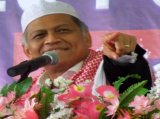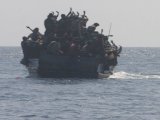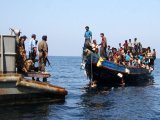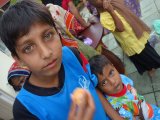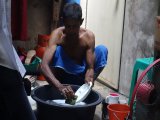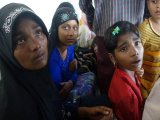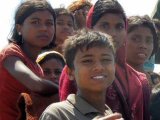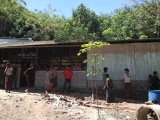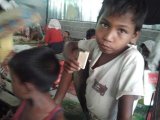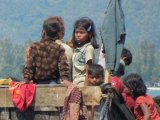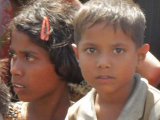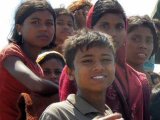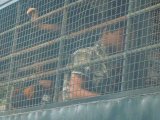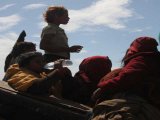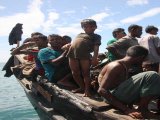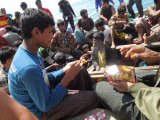BANGKOK: The Thai government fell short in 2012 in addressing the country's many serious human rights problems, Human Rights Watch said today in its World Report 2013.
In its 665-page report, Human Rights Watch assessed progress on human rights during the past year in more than 90 countries, including an analysis of the aftermath of the Arab Spring.
In Thailand, the government of Prime Minister Yingluck Shinawatra has politicised efforts to hold accountable those responsible for political violence in 2010. It cracked down on the free expression rights of people deemed critical of the monarchy.
And it took no action against security forces who reacted to insurgent atrocities with abuses in the southern border provinces.
The government pushed ethnic Rohingya ''boat people'' back to sea, and failed to provide protections for the many unauthorised Burmese in the country.
''The Yingluck government's response to the 2010 political turmoil has been to repeat its predecessor's mistake by seeking a one-sided 'victor's justice,''' said Brad Adams, Asia director at Human Rights Watch.
'
'For Thailand to gain credibility on rights, leaders need to show a resolve to treat serious problems impartially and with respect for the rule of law.''
Thailand suffered devastating political violence during the 2010 street confrontations between the government of then-Prime Minister Abhisit Vejjajiva and the United Front for Democracy against Dictatorship, known as the ''Red Shirts.''
At least 90 people died and more than 2000 were injured in the violence.
Neither the Abhisit nor the current Yingluck governments have sought to address the violence in an impartial manner. The Abhisit government charged hundreds of UDD leaders and supporters with serious criminal offenses, but failed to file charges against any military personnel implicated in the violence.
The Yingluck government, which has the UDD's backing, has taken a similarly one-sided approach, focusing criminal investigations to prosecute Abhisit and a former deputy prime minister for authorising soldiers to use live ammunition and lethal force while downplaying deadly violence by UDD-linked ''Black Shirts.''
Early drafts of a National Reconciliation Bill submitted to parliament in May 2012 by Yingluck's ruling Pheu Thai Party and its coalition partners would effectively prevent prosecutions of either side for the political violence.
While the number of prosecutions for lese majeste has declined since Yingluck took office, Thai authorities continue to use draconian statutes in the Penal Code and the Computer Crimes Act to restrict freedom of expression, including on the internet.
Thousands of websites have been blocked as ''offensive to the monarchy.'' People charged with lese majeste offenses were often denied bail and remained jailed for many months awaiting trial.
Sentences have often been harsh. Amphon Tangnoppakul, who was sentenced in November 2011 to 20 years in prison for sending four lese majeste SMS messages in 2010, died of cancer in prison on May 8, 2012.
''The lese majeste and Computer Crime Act bring a climate of fear over all political speech in Thailand, whether in print or on social media,'' said Adams. ''The government needs to take action to prevent Thailand's space for free speech from diminishing further.''
In Thailand's southern border provinces, separatist ethnic Malay Muslim insurgents in the network of National Revolution Front-Coordinate continued to target civilians in bomb attacks, roadside ambushes, drive-by shootings, and assassinations.
Civilians make up more than 90 percent of the more than 5000 deaths in the south since 2004. Insurgents burned down government-run schools and assassinated teachers whom they accused of representing the ideology of the Thai Buddhist state.
State security forces have committed killings, enforced disappearances, and torture against alleged insurgent supporters, yet no officials or security force personnel have been prosecuted for abuses.
In 2012, Thailand continued to deny the United Nations refugee agency access to newly arriving ethnic Rohingya from Burma to assess possible refugee claims. Thai authorities renewed a policy of intercepting and pushing back boats carrying ethnic Rohingya Muslims.
When boats made landfall or were judged unseaworthy, Thai immigration officials stepped in to enforce deportation by land.
This ''soft deportation'' process has resulted in Rohingya who have fled violence being sent back across the Thai-Burma border where they try again to leave by boat.
Yingluck stated publicly that positive developments in Burma would not result in the 140,000 refugees living in camps on the Thai-Burmese border being forced to return home.
In the meantime, those Burmese living precariously in urban areas face exploitation and abuse by Thai authorities and employers.
''Thai authorities treat the Rohingya as a pariah group to be pushed back to sea or returned to persecution in Burma,'' said Adams. ''Thailand needs to revamp its laws on refugees to ensure it meets it international obligations.''
Thai labor laws afforded migrant workers little protection. When the migrant worker registry and ''nationality verification'' scheme came to an end in December, hundreds of thousands of unregistered workers from Burma, Laos, and Cambodia were left in limbo and threatened with immediate arrest and deportation.
Thai employers continued to seize migrant workers' documents, and Thai government policy imposed severe restrictions on migrant workers' ability to change employers.
''After almost two years in office, Prime Minister Yingluck has failed to adopt any significant measures to end abuses, stop censorship, protect workers, and curtail impunity,'' said Adams.
''If Thailand wants to stand out as a leading democracy in the region and an influential member state at the UN, it needs to urgently take up justice, free speech, and political reforms.''
To read Human Rights Watch's World Report 2013 chapter on Thailand, please visit:
www.hrw.org/world-report/2013/country-chapters/world-report-2013-thailand
BANGKOK: Burma's human rights situation remained poor in 2012, despite some noteworthy actions by the government to adopt rights-respecting reforms, Human Rights Watch said in its World Report 2013 released today.
In its 665-page report, Human Rights Watch assessed progress on human rights during the past year in more than 90 countries, including an analysis of the aftermath of the Arab Spring.
Over the past year, the Burmese government released nearly 400 political prisoners, relaxed media censorship, and permitted opposition leader Aung San Suu Kyi and her National League for Democracy party to assume the 43 parliamentary seats it won in April's by-election.
But the government failed to hold security forces accountable for serious abuses against civilians during the armed conflict in Kachin State and sectarian violence targeting Rohingya Muslims in Arakan State, obstructed humanitarian aid to tens of thousands of displaced people in both crisis areas, and cracked down on peaceful demonstrators in Rangoon and elsewhere, Human Rights Watch said.
''Burma's reforms over the past year are hindered, not helped, by international oversell and hasty praise in the face of continued serious human rights abuses,'' said Phil Robertson, deputy Asia director at Human Rights Watch.
''No one expects that a rights-respecting democracy will arrive overnight, but Burma is still failing basic rights tests on its remaining political prisoners, blocked humanitarian aid, and ensuring accountability for war crimes.''
In June, deadly sectarian violence erupted in Arakan State between ethnic Arakanese Buddhists and ethnic Rohingya Muslims, a long-persecuted minority of approximately 800,000 to one million people.
The Rohingya are systematically denied citizenship by the Burmese government, making them stateless. State security forces initially failed to protect either community, resulting in some 100,000 displaced, and then increasingly targeted Rohingya in killings, beatings, and mass arrests, while obstructing humanitarian access to Rohingya areas and to camps of displaced Rohingya around the Arakan State capital, Sittwe.
In October, violence and abuses erupted again in nine of Arakan State's 17 townships, including in several townships that did not experience violence in June, resulting in an unknown number of deaths and injuries, the razing of entire Muslim villages, and the displacement of an additional 35,000 Muslims.
Many of the displaced fled to areas surrounding Sittwe, where they also experienced abuses, such as beatings by state security forces.
Armed conflict between the Burmese government and the Kachin Independence Army continued in Kachin State in the north - including government airstrikes in late December - where an estimated 90,000 civilians remain displaced.
The government continues to deny humanitarian aid to the displaced Kachin civilians in KIA territory, and in August, more than 4000 Kachin refugees in Yunnan province, China, were forced back to the conflict zone in Kachin State, in violation of international law, putting further pressure on the isolated displaced person camps in Kachin State.
In the conflict areas in Kachin and Shan States, the Burmese military carried out extrajudicial killings, sexual violence, torture, forced labor, and deliberate attacks on civilian areas, all which continue with impunity. Ceasefire agreements in the ethnic conflict areas of eastern Burma remain tenuous, and an estimated 400,000 people remain displaced in eastern Burma due to decades of conflict.
In September, 13 activists in Rangoon faced charges for failing to get permission for a demonstration held peacefully to oppose the armed conflict in Kachin State.
Nine have been charged in multiple courts and face several years in prison if convicted. The government cracked down on other peaceful protests, including a violent crackdown on demonstrators against a military and Chinese-run copper mine in Sagaing Division, which left more than 20 protesters, including Buddhist monks, severely burned.
Laws that have been used to imprison peaceful activists, lawyers, and journalists remain on the books, including, among others, the Unlawful Associations Act, the Electronics Act, the State Protection Act, and the Emergency Provisions Act. While Burmese President Thein Sein released an estimated 400 political prisoners in 2012 in general amnesties, as many as several hundred more political prisoners remain in prison. Freed political prisoners face restrictions on travel and education, and lack adequate psychosocial support.
Despite serious ongoing abuses, foreign governments - including the United States and the United Kingdom - continued their expressions of optimism about political reforms while prematurely easing or lifting political and economic sanctions against Burma, Human Rights Watch said.
Following a historic visit to the country by US President Barack Obama in November, Thein Sein committed to inviting the United Nations Office of the High Commissioner for Human Rights to establish a presence in the country, and to establishing an independent mechanism to focus on remaining political prisoners, among other commitments that have yet to materialise.
''The US, UK, and other influential governments should hold Burma to the human rights commitments it made during last year's well-publicised international visits,'' Robertson said.
''Systematically releasing the remaining political prisoners and opening a UN rights office are key benchmarks. Foreign governments should recognise that Burma's history shows that a tough response to rights abuses doesn't derail reform, but promotes it.''
To read Human Rights Watch's World Report 2013 chapter on Burma, please visit:
www.hrw.org/world-report/2013/country-chapters/world-report-2013-burma
In its 665-page report, Human Rights Watch assessed progress on human rights during the past year in more than 90 countries, including an analysis of the aftermath of the Arab Spring.
In Thailand, the government of Prime Minister Yingluck Shinawatra has politicised efforts to hold accountable those responsible for political violence in 2010. It cracked down on the free expression rights of people deemed critical of the monarchy.
And it took no action against security forces who reacted to insurgent atrocities with abuses in the southern border provinces.
The government pushed ethnic Rohingya ''boat people'' back to sea, and failed to provide protections for the many unauthorised Burmese in the country.
''The Yingluck government's response to the 2010 political turmoil has been to repeat its predecessor's mistake by seeking a one-sided 'victor's justice,''' said Brad Adams, Asia director at Human Rights Watch.
'
'For Thailand to gain credibility on rights, leaders need to show a resolve to treat serious problems impartially and with respect for the rule of law.''
Thailand suffered devastating political violence during the 2010 street confrontations between the government of then-Prime Minister Abhisit Vejjajiva and the United Front for Democracy against Dictatorship, known as the ''Red Shirts.''
At least 90 people died and more than 2000 were injured in the violence.
Neither the Abhisit nor the current Yingluck governments have sought to address the violence in an impartial manner. The Abhisit government charged hundreds of UDD leaders and supporters with serious criminal offenses, but failed to file charges against any military personnel implicated in the violence.
The Yingluck government, which has the UDD's backing, has taken a similarly one-sided approach, focusing criminal investigations to prosecute Abhisit and a former deputy prime minister for authorising soldiers to use live ammunition and lethal force while downplaying deadly violence by UDD-linked ''Black Shirts.''
Early drafts of a National Reconciliation Bill submitted to parliament in May 2012 by Yingluck's ruling Pheu Thai Party and its coalition partners would effectively prevent prosecutions of either side for the political violence.
While the number of prosecutions for lese majeste has declined since Yingluck took office, Thai authorities continue to use draconian statutes in the Penal Code and the Computer Crimes Act to restrict freedom of expression, including on the internet.
Thousands of websites have been blocked as ''offensive to the monarchy.'' People charged with lese majeste offenses were often denied bail and remained jailed for many months awaiting trial.
Sentences have often been harsh. Amphon Tangnoppakul, who was sentenced in November 2011 to 20 years in prison for sending four lese majeste SMS messages in 2010, died of cancer in prison on May 8, 2012.
''The lese majeste and Computer Crime Act bring a climate of fear over all political speech in Thailand, whether in print or on social media,'' said Adams. ''The government needs to take action to prevent Thailand's space for free speech from diminishing further.''
In Thailand's southern border provinces, separatist ethnic Malay Muslim insurgents in the network of National Revolution Front-Coordinate continued to target civilians in bomb attacks, roadside ambushes, drive-by shootings, and assassinations.
Civilians make up more than 90 percent of the more than 5000 deaths in the south since 2004. Insurgents burned down government-run schools and assassinated teachers whom they accused of representing the ideology of the Thai Buddhist state.
State security forces have committed killings, enforced disappearances, and torture against alleged insurgent supporters, yet no officials or security force personnel have been prosecuted for abuses.
In 2012, Thailand continued to deny the United Nations refugee agency access to newly arriving ethnic Rohingya from Burma to assess possible refugee claims. Thai authorities renewed a policy of intercepting and pushing back boats carrying ethnic Rohingya Muslims.
When boats made landfall or were judged unseaworthy, Thai immigration officials stepped in to enforce deportation by land.
This ''soft deportation'' process has resulted in Rohingya who have fled violence being sent back across the Thai-Burma border where they try again to leave by boat.
Yingluck stated publicly that positive developments in Burma would not result in the 140,000 refugees living in camps on the Thai-Burmese border being forced to return home.
In the meantime, those Burmese living precariously in urban areas face exploitation and abuse by Thai authorities and employers.
''Thai authorities treat the Rohingya as a pariah group to be pushed back to sea or returned to persecution in Burma,'' said Adams. ''Thailand needs to revamp its laws on refugees to ensure it meets it international obligations.''
Thai labor laws afforded migrant workers little protection. When the migrant worker registry and ''nationality verification'' scheme came to an end in December, hundreds of thousands of unregistered workers from Burma, Laos, and Cambodia were left in limbo and threatened with immediate arrest and deportation.
Thai employers continued to seize migrant workers' documents, and Thai government policy imposed severe restrictions on migrant workers' ability to change employers.
''After almost two years in office, Prime Minister Yingluck has failed to adopt any significant measures to end abuses, stop censorship, protect workers, and curtail impunity,'' said Adams.
''If Thailand wants to stand out as a leading democracy in the region and an influential member state at the UN, it needs to urgently take up justice, free speech, and political reforms.''
To read Human Rights Watch's World Report 2013 chapter on Thailand, please visit:
www.hrw.org/world-report/2013/country-chapters/world-report-2013-thailand
BANGKOK: Burma's human rights situation remained poor in 2012, despite some noteworthy actions by the government to adopt rights-respecting reforms, Human Rights Watch said in its World Report 2013 released today.
In its 665-page report, Human Rights Watch assessed progress on human rights during the past year in more than 90 countries, including an analysis of the aftermath of the Arab Spring.
Over the past year, the Burmese government released nearly 400 political prisoners, relaxed media censorship, and permitted opposition leader Aung San Suu Kyi and her National League for Democracy party to assume the 43 parliamentary seats it won in April's by-election.
But the government failed to hold security forces accountable for serious abuses against civilians during the armed conflict in Kachin State and sectarian violence targeting Rohingya Muslims in Arakan State, obstructed humanitarian aid to tens of thousands of displaced people in both crisis areas, and cracked down on peaceful demonstrators in Rangoon and elsewhere, Human Rights Watch said.
''Burma's reforms over the past year are hindered, not helped, by international oversell and hasty praise in the face of continued serious human rights abuses,'' said Phil Robertson, deputy Asia director at Human Rights Watch.
''No one expects that a rights-respecting democracy will arrive overnight, but Burma is still failing basic rights tests on its remaining political prisoners, blocked humanitarian aid, and ensuring accountability for war crimes.''
In June, deadly sectarian violence erupted in Arakan State between ethnic Arakanese Buddhists and ethnic Rohingya Muslims, a long-persecuted minority of approximately 800,000 to one million people.
The Rohingya are systematically denied citizenship by the Burmese government, making them stateless. State security forces initially failed to protect either community, resulting in some 100,000 displaced, and then increasingly targeted Rohingya in killings, beatings, and mass arrests, while obstructing humanitarian access to Rohingya areas and to camps of displaced Rohingya around the Arakan State capital, Sittwe.
In October, violence and abuses erupted again in nine of Arakan State's 17 townships, including in several townships that did not experience violence in June, resulting in an unknown number of deaths and injuries, the razing of entire Muslim villages, and the displacement of an additional 35,000 Muslims.
Many of the displaced fled to areas surrounding Sittwe, where they also experienced abuses, such as beatings by state security forces.
Armed conflict between the Burmese government and the Kachin Independence Army continued in Kachin State in the north - including government airstrikes in late December - where an estimated 90,000 civilians remain displaced.
The government continues to deny humanitarian aid to the displaced Kachin civilians in KIA territory, and in August, more than 4000 Kachin refugees in Yunnan province, China, were forced back to the conflict zone in Kachin State, in violation of international law, putting further pressure on the isolated displaced person camps in Kachin State.
In the conflict areas in Kachin and Shan States, the Burmese military carried out extrajudicial killings, sexual violence, torture, forced labor, and deliberate attacks on civilian areas, all which continue with impunity. Ceasefire agreements in the ethnic conflict areas of eastern Burma remain tenuous, and an estimated 400,000 people remain displaced in eastern Burma due to decades of conflict.
In September, 13 activists in Rangoon faced charges for failing to get permission for a demonstration held peacefully to oppose the armed conflict in Kachin State.
Nine have been charged in multiple courts and face several years in prison if convicted. The government cracked down on other peaceful protests, including a violent crackdown on demonstrators against a military and Chinese-run copper mine in Sagaing Division, which left more than 20 protesters, including Buddhist monks, severely burned.
Laws that have been used to imprison peaceful activists, lawyers, and journalists remain on the books, including, among others, the Unlawful Associations Act, the Electronics Act, the State Protection Act, and the Emergency Provisions Act. While Burmese President Thein Sein released an estimated 400 political prisoners in 2012 in general amnesties, as many as several hundred more political prisoners remain in prison. Freed political prisoners face restrictions on travel and education, and lack adequate psychosocial support.
Despite serious ongoing abuses, foreign governments - including the United States and the United Kingdom - continued their expressions of optimism about political reforms while prematurely easing or lifting political and economic sanctions against Burma, Human Rights Watch said.
Following a historic visit to the country by US President Barack Obama in November, Thein Sein committed to inviting the United Nations Office of the High Commissioner for Human Rights to establish a presence in the country, and to establishing an independent mechanism to focus on remaining political prisoners, among other commitments that have yet to materialise.
''The US, UK, and other influential governments should hold Burma to the human rights commitments it made during last year's well-publicised international visits,'' Robertson said.
''Systematically releasing the remaining political prisoners and opening a UN rights office are key benchmarks. Foreign governments should recognise that Burma's history shows that a tough response to rights abuses doesn't derail reform, but promotes it.''
To read Human Rights Watch's World Report 2013 chapter on Burma, please visit:
www.hrw.org/world-report/2013/country-chapters/world-report-2013-burma


